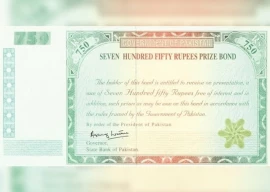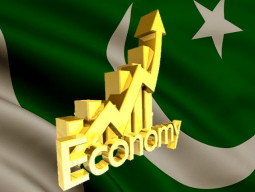
The single development that has recently irked the country’s industrial sector most is the increase in rates of the Gas Infrastructure Development Cess (GIDC). But for Engro Fertilizers – one of the two new entrants of the industry – the increase in GIDC is not the only problem.
Incorporated in 2009, Engro Fertilizers is a subsidiary of Engro Corporation – one of the leading fertilizer manufacturing and marketing companies in the country with an annual urea production capacity of 2.3 million tons.
In an interview with The Express Tribune, Engro Fertilizer Chief Executive Officer Ruhail Mohammad said that he is neither against the rise in the GIDC, nor he believes it is the only problem for the industry.
“I am not against higher gas prices per se,” said Mohammad. “Simply because we have to bring a balance in gas and other fuel alternatives, so that we can switch to new ones.”
“Whether the best way of increasing prices is GIDC, I will leave it to the government, provided that the commitments are fulfilled,” he added.
Now what are these commitments?
While raising the GIDC rates for all the fertiliser plants from this month, the government also levied it on Engro and Fatima Fertilizers – the two new plants that were established under the 2001 fertiliser policy. It imposed Rs300 per million British thermal units (mmbtu) GIDC on the supply of feed gas to all the plants.
According to the 2001 policy, the government has a 10-year legal obligation to supply gas at $0.7 per mmbtu to these two new fertiliser companies. GIDC levy has irked these two players and now they are trying to convince the government to take it back, in which they have not succeeded yet.
One of the reasons why these two companies are agitating is that these new plants have to pay interest, depreciation and repay loans compared to their old rivals. Their lower feed gas price was their main incentive for the investments that they had made.
“The government had promised a 10-year gas supply without levying any additional tax,” said Mohammad. “All I can say is that Engro should get what it is was promised, and whatever price is given to others is the government’s lookout.”
The government’s decision to levy same GIDC rates on new fertiliser plants was in line with the Competition Commission of Pakistan’s policy advice, which recommended it to slap the same GIDC rate on all plants, whether old or new, to create a level playing field in the urea market.
Other than convincing the government, do these companies have any other way forward?
When asked about knocking on the court’s door, Mohammad said that he will consider it after consultation. “We have taken legal advice and if at the end of the day there is no satisfactory solution, we will have to seek legal remedy,” he added.
Speaking on chances of winning the legal battle on this issue, he said the case of his company is “pretty strong”.
Replying to another question, he said Fatima Fertilizer and Engro have been talking to each other and asking about steps to curtail this issue.
Mohammad believes that the gas shortage in the country will only further deteriorate if new reserves are not explored on time. “Gas reserves are depleting very fast and they will further deplete from the current 4 billion cubic feet per day (bcfd), to just 2.5 bcfd by 2020 if new discoveries are not made in the near future,”
At present, the total gas consumption is over 6 bcfd in the country.
“The only way for the industries is to switch to other fuel alternatives,” he added.
Published in The Express Tribune, July 21st, 2014.
Like Business on Facebook, follow @TribuneBiz on Twitter to stay informed and join in the conversation.
COMMENTS (5)
Comments are moderated and generally will be posted if they are on-topic and not abusive.
For more information, please see our Comments FAQ
1736938320-0/BeFunky-collage-(52)1736938320-0-405x300.webp)

1736235029-0/diddy-(50)1736235029-0-165x106.webp)
1736930668-0/Untitled-design-(97)1736930668-0-165x106.webp)
1736931444-0/BeFunky-collage-(51)1736931444-0-165x106.webp)






1732012115-0/Untitled-design-(14)1732012115-0-270x192.webp)
1736844405-0/Express-Tribune-(2)1736844405-0-270x192.webp)










@Muhammad: that is all true but a contractual obligation is a contractual obligation! The government should not have made it if they could not fulfill it.
@Fahd:
I am fully aware of issues Engro is facing but those are all overshadowed when you look at the balance sheet of EFert....5.5 Billion Rs, net profit.....
And I, as a tax payer, is paying for the the subsidy on feed gas and I can not allow Engro to steal Feed gas and burn it in their gas turbines and boilers as fuel gas. They are saving millions in terms of (black) profits by playing this trick.
And the issues you are highlighting are self inflicted and are much less severe than being faced by majority of industry due to gas shortage, the 100 MMSCFD that a single fertilizer plant consumes can run at least a 100 Taxtile mills or other factories and can provide livelihood to many more families than Efert can provide. Urea can be imported at same rates from abroad.
@Muhammad: You need to research a bit more before arriving at a conclusion. Maybe you need to work as an intern at the plant for a weeks to understand the issues Engro Fertilizers is facing right now! :)
“Gas reserves are depleting very fast and they will further deplete from the current 4 billion cubic feet per day (bcfd), to just 2.5 bcfd by 2020 if new discoveries are not made in the near future,”
Good thing they removed the ban on CNG kit imports, then. Oh wait...
Engro Fert makes huge profits (Around Rs 5.5 Bn in 2013) and yet all we hear from them a foul cries.
They make huge profits under the carpet and never disclose that i.e. they get FEED gas for Ammonia synthesis at discounted rate. They are bleeding a significant quantity of FEED gas off the Ammonia plant and consume it in their utilities plant as fuel gas. Hence they save millions on fuel gas consumption by simply purging the cheap FEED gas and consuming it as FUEL gas.
This catch they would never disclose.